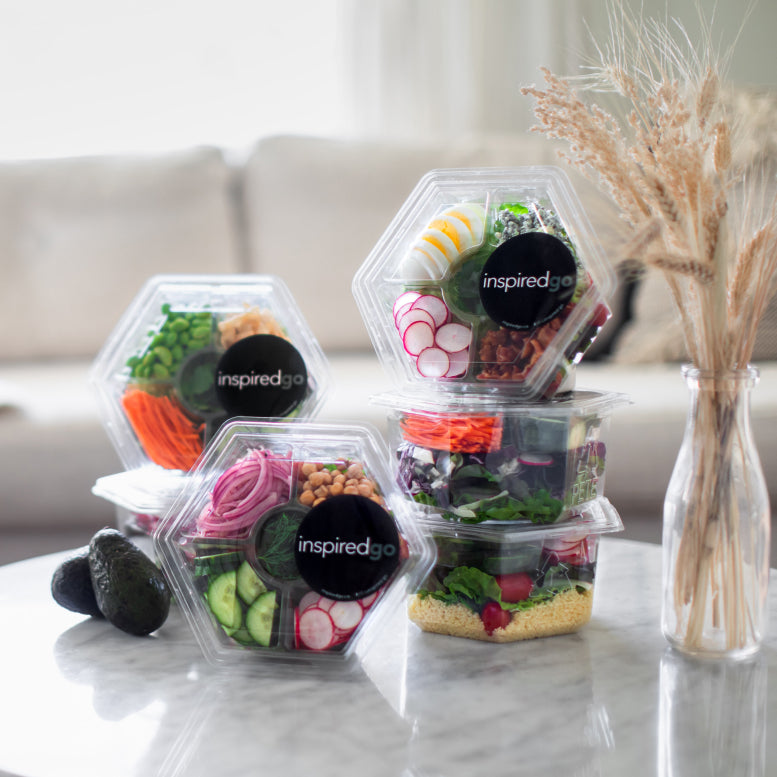Are There Vegan Gluten-free Meal Deliveries?
Table of Contents
1. Diverse Dietary Options at Inspired Go
2. Are Gluten-Free Meal Deliveries Safe for People with Celiac Disease?
3. What Should You Expect from a High-Quality Gluten-Free Meal?
4. Why Do Health-Conscious Shoppers Choose Inspired Go for Gluten-Free Meals?
1. Diverse Dietary Options at Inspired Go
Inspired Go recognizes the diverse dietary needs of today's individuals, making it the go-to choice for conveniently delivered, ready-to-eat meals. Whether you're following a vegan lifestyle, need gluten-free options, or simply want to maintain a balanced diet, Inspired Go has got you covered. Our menu features a variety of vegan, gluten-free meals, all designed by professional chefs and packed with nutrient-rich, locally sourced ingredients. We're not just about providing meals; we're about encouraging a lifestyle that values health, convenience, and sustainability. Every meal ordered means less time spent on grocery shopping and meal prep, less food waste, and more time to enjoy life's other pleasures. With Inspired Go, maintaining your dietary preferences has never been easier or more enjoyable.
Order fresh salads today →


2. Are Gluten-Free Meal Deliveries Safe for People with Celiac Disease?
One of the most important considerations when ordering gluten-free meals is whether they are truly safe for people with celiac disease. The best gluten-free meal delivery services clearly indicate whether their meals are certified gluten-free, using trusted third-party testing and preparation in dedicated facilities. This ensures that there’s no cross-contamination, which is crucial for those with gluten intolerance or autoimmune responses. Many services also publish allergen information and ingredient sourcing for full transparency. For people wondering,“Are gluten-free meal kits certified gluten-free?”—it depends on the provider, but leading options often meet strict standards. If you're ordering for yourself or a family member with celiac, always look for certifications and consider contacting customer service for assurance. Safety isn’t a luxury—it’s a necessity in gluten-free dining.
Choose your salads and schedule delivery →
3. What Should You Expect from a High-Quality Gluten-Free Meal?
When exploring gluten-free meal delivery options, quality is about more than just removing gluten—it’s about creating meals that are well-rounded, satisfying, and safe for sensitive diets. High-quality gluten-free meals often include lean proteins, vibrant vegetables, and naturally gluten-free grains like brown rice or quinoa. You’ll also find wholesome add-ons such as house-made sauces, herbs, or toppings made without common allergens. These meals are often designed by culinary professionals or nutritionists to ensure balance in flavor and nutrition. Some plans highlight global flavors or seasonal ingredients to bring variety without compromising dietary needs. If you're wondering whether gluten-free meal kits can be exciting or filling, the answer is yes—when done right, these meals are both practical and flavorful, helping people stay consistent with gluten-free eating.
Get fresh salads and snacks delivered →
4. Why Do Health-Conscious Shoppers Choose Inspired Go for Gluten-Free Meals?
Health-focused eaters trust Inspired Go because the brand consistently delivers gluten-free meals that support their wellness goals without compromising on taste or nutrition. These meals are built around clean-label ingredients—no preservatives, no fillers, and no gluten—just whole foods prepared with purpose. Whether you're looking to boost energy, reduce inflammation, or manage symptoms of gluten sensitivity, Inspired Go offers meals that align with these goals. With fast delivery and a 5-day fridge life on most items, it's a seamless way to keep healthy choices at your fingertips. Their meals also support plant-forward eating, gut health, and balanced macros, making them especially popular with customers following anti-inflammatory or low-FODMAP diets. It’s healthy eating—designed to fit real life.
Try our fresh, ready-to-eat salads →
Frequently Asked Questions
The key difference between vegan and vegetarian diets lies in the exclusion of animal products. Vegetarians avoid meat, poultry, and fish but may consume animal-derived products like eggs, dairy, or honey. Vegans, on the other hand, exclude all animal products, focusing solely on plant-based foods. Veganism is often a lifestyle choice, avoiding animal products in all forms, including clothing and cosmetics.
A vegan diet consists entirely of plant-based foods, including fruits, vegetables, grains, nuts, seeds, and legumes. It excludes all animal-derived products, such as meat, fish, dairy, and eggs. This diet emphasizes nutrient-dense, whole foods, though processed vegan alternatives are available. A vegan diet, when well-balanced, supports good health and environmental sustainability, making it popular for ethical, health, and ecological reasons.
Not all vegan diets are gluten-free. While veganism excludes animal products, gluten is a protein found in wheat, barley, and rye, which are plant-based and commonly included in vegan meals. To maintain a vegan and gluten-free diet, focus on naturally gluten-free foods like fruits, vegetables, rice, quinoa, and gluten-free grains. Always check labels for hidden gluten in processed vegan foods.
On a vegan diet, you can enjoy a wide variety of plant-based foods, including fruits, vegetables, legumes, nuts, seeds, whole grains, and plant-based dairy alternatives. Popular vegan dishes include stir-fries, salads, grain bowls, soups, and curries. Incorporating fortified foods or supplements ensures you meet nutrient needs like B12, iron, and omega-3s, making the diet balanced and enjoyable.
A vegan diet can be very healthy when balanced and diverse. It’s rich in fiber, vitamins, and antioxidants, while being lower in saturated fat and cholesterol. These factors contribute to better heart health, weight management, and reduced risk of chronic diseases. However, careful planning is essential to ensure adequate intake of nutrients like vitamin B12, iron, and protein for overall health.

